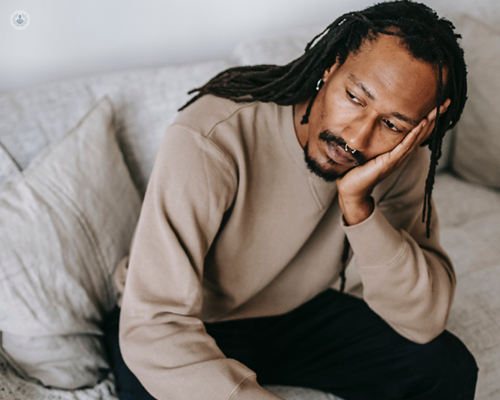Shining a light on male menopause
Autore:The menopause is a condition that can affect men as well as women, and its symptoms in men can be just as debilitating.
Here to highlight just exactly how it manifests and ways to go about relieving male menopause, is a highly-experienced, London-based general practitioner Dr Daniel Wright. Read on to find out more in this informative, reassuring article.

What is the male menopause?
Menopause is usually a condition associated with women as they age but it can also affect men. The male menopause, also known as testosterone deficiency, androgen deficiency, or late on-set hypogonadism, generally affects over men over 50 years old.
What are the causes of male menopause?
A series of clear changes occur as women go through the menopause, as ovulation ends and periods stop. It’s a different process for men and as levels of testosterone decrease with age, they can also suffer a series of troublesome symptoms.
What are the signs and symptoms of male menopause?
Testosterone levels declining as men age can cause a range of physical, emotional and mental issues including:
- Erectile dysfunction
- Problems sleeping
- Mood swings
- Forgetfulness
- Loss of muscle mass
- Fatigue
Is the male menopause a state of mind, or a genuine condition?
Some men go through times of high stress and experience physiological problems around their fifties. This can be caused by:
- Work
- Money worries
- Relationship issues
- Divorce
In conversation, heightened stress and anxiety are often referred to as part of a ‘midlife crisis’. It can have a distressing effect on a man’s life, despite it often being made light of. All of these factors can contribute to male menopause symptoms and impact our testosterone levels.
What can be done about low testosterone levels?
It’s important to understand what forms they come in when we discuss what can be done about low testosterone.
There are three testosterone forms:
Total testosterone
This is all of the bound (unavailable) and unbound (available) testosterone in your body. This comprises of free testosterone, testosterone bound with the sex hormone binding globulin (SHBG) and testosterone bound with albumin (a protein made by your liver).
Free testosterone
This is responsible for all of the positive things we associate with testosterone; muscle building, libido and general wellness. While this only makes up about one to two per cent of the total testosterone in a man’s body, it’s so potent that it’s enough!
SHBG
Testosterone bound to this hormone is completely inactive, so people with high levels of SHBG can show symptoms of hypogonadism (low testosterone).
Natural testosterone boosters
It’s worth exploring any lifestyle changes that can be made to help naturally boost your testosterone, before thinking about medicinal testosterone supplementation. For example, you could try:
- Working out: Especially through relatively low-impact repetition exercises, you can activate your major muscle groups.
- Consuming testosterone-boosting foods such as healthy fats, good-quality protein and complex carbohydrate as well as ginger, ashwagandha and foods high in zinc and magnesium.
- Get high quality and quantity sleep.
- Reducing your stress levels.
- Decreasing your alcohol intake.
Furthermore, boron, which is a trace mineral, has some increasingly good evidence on increasing your free testosterone levels by decreasing your SHBG levels.
Supplementation using medicinal testosterone
This comes in a number of forms. So, if a change in lifestyle alongside natural boosters haven’t worked and you continue to struggle with symptoms of male menopause, you can arrange an appointment with The Wright Practice to discuss your further treatment options.
If you’d like to address male menopause or other specialties, such as sexual health, sexually-transmitted infections and alcoholism, that Dr Wright can expertly treat, visit his Top Doctors profile to arrange a consultation today.


